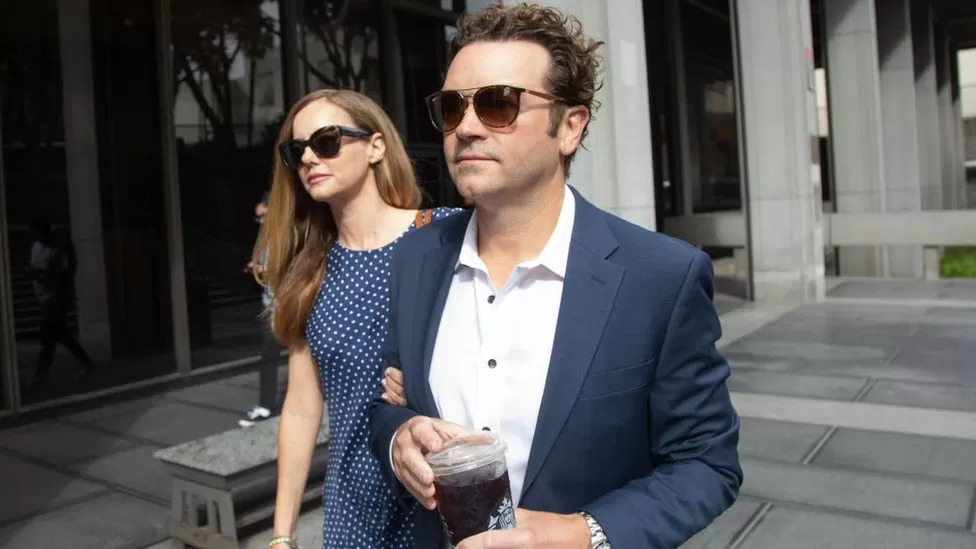A jury in Los Angeles has found US actor Danny Masterson guilty on two out of three counts of rape.
The star of That ’70s Show, a TV series, faces up to 30 years in prison. He was led from court in handcuffs.
Three women, all former members of the Church of Scientology, accused the actor of sexual assault at his Hollywood home from 2001-03.
Prosecutors argued Masterson had relied on his status as a prominent Scientologist to avoid accountability.
The jury of seven women and five men was unable to reach a verdict on a third count after a week of deliberations, ending up deadlocked at 8-4.
One of his victims, who was raped in 2003, said in a statement quoted by the Associated Press: “I am experiencing a complex array of emotions – relief, exhaustion, strength, sadness – knowing that my abuser, Danny Masterson, will face accountability for his criminal behaviour.”
Masterson’s wife, actress and model Bijou Phillips, wept as he was led away, CBS News reports. Other family and friends sat stone-faced.
Another jury in an earlier trial was unable to reach a verdict in December 2022.
Prosecutors chose to retry Masterson and this time the judge allowed attorneys to present new evidence that had been barred from the first trial.
Though the actor was not charged with drugging his victims, the jury heard testimony that the women had been dosed before he raped them.
Masterson was first accused of rape in 2017 during the height of the #MeToo movement. He responded by saying that he had not been charged or convicted of a crime, and that in the climate at the time “it seems as if you are presumed guilty the moment you are accused”.
Charges came after a three-year investigation by the Los Angeles Police Department. Prosecutors did not file charges in two other cases because of insufficient evidence and the statute of limitations expiring.
Throughout the trial, prosecutors argued that the Church of Scientology had helped cover up the assaults – an allegation the organisation has categorically denied.
In a statement after the verdict was announced, the International Church of Scientology claimed prosecutors’ attacks on the Church during the trial were “an unprecedented violation of the First Amendment”.
“The Church was not a party to this case and religion did not belong in this proceeding,” the organisation wrote on Twitter. “The District Attorney unconscionably centred his prosecution on the defendant’s religion.”
At the time of the assaults, Masterson and all three of his accusers were Scientologists. Several of the women said it took them years to come forward because Church of Scientology officials discouraged them from reporting the rape to police.
Instead, they were forced to rely on the Church’s “internal justice system”, prosecutors said.
Scientology officials told one survivor she would be kicked out of the Church unless she signed a non-disclosure agreement and accepted a payment of $400,000 (£320,000), according to prosecutors.
Judge Charlaine Olmedo allowed both sides to discuss the dogma and practices of Scientology.
But Deputy District Attorney Ariel Anson told jurors during the trial: “The Church taught his victims, ‘Rape isn’t rape, you caused this, and above all, you are never allowed to go to law enforcement.'”
In its statement, the Church said there was “not a scintilla of evidence supporting the scandalous allegations that the Church harassed the accusers”.
Throughout the trial, the defence tried to undermine the credibility of the “Jane Does” by focusing on inconsistencies in their testimony and their supposed drive to get “revenge” against their former Church.
During closing arguments, Masterson’s defence lawyer said of the survivors: “If you are looking for motives why people are not being truthful… there are motives all over the place.”
Although the Church of Scientology was not a defendant in the case, before closing arguments began, a lawyer with ties to the Church emailed the district attorney’s office to complain about the way the Church was portrayed during the retrial.
The defence also argued that the prosecution had relied heavily on testimony about drugging because there was an absence of evidence of any force or violence.
Masterson’s lawyers tried, unsuccessfully, to have a mistrial declared.
Source : BBC

